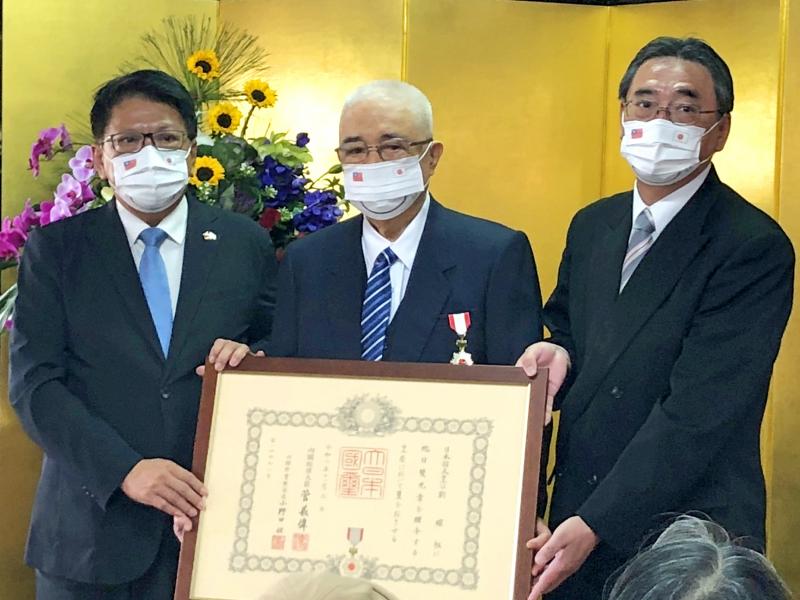Liu Yao-tzu (劉耀祖), one of three Taiwanese to be honored with Japan’s Order of the Rising Sun last year, was yesterday presented with the medal by Japan-Taiwan Exchange Association Kaohsiung office director Eji Kato.
Yesterday was also the 20th anniversary of the foundation of the Dr Ikegami Ichiro Memorial Library which Liu manages. The library in Pingtung County’s Jhutian Township (竹田) opened its doors on Jan. 16, 2001, the 90th birthday of Ikegami, who from 1943 to 1945 served as director of a Japanese military hospital in the township. It currently holds a collection of nearly 20,000 books, mostly in Japanese.
Aside from establishing and managing the library, the 90 year-old Liu also organizes many events to promote cultural exchanges between Taiwan and Japan. Not only has he donated his lifetime collection of Japanese books to the library, Liu has also established close ties with universities and high schools in Pingtung, and provides materials and space for exhibitions.

Photo: Lo Hsin-chen, Taipei Times
Liu’s contributions to the promotion of the Japanese language in Taiwan has had a lasting influence, the Pintung government said.
Eji said that the library and Liu’s dedication to exchanges between the nations has contributed to their close ties and the knowledge of Japan in Taiwan.
The Order of the Rising Sun is given to foreigners who have demonstrated dedication to promoting and fostering ties with Japan, the foundation said.
Among the 141 people who were in November last year announced as recipients, three are Taiwanese, it added.
The order honors the past, present and future, Liu said, adding that it was a great honor to receive it on behalf of all those who have made the memorial library possible.

Nipah virus infection is to be officially listed as a category 5 notifiable infectious disease in Taiwan in March, while clinical treatment guidelines are being formulated, the Centers for Disease Control (CDC) said yesterday. With Nipah infections being reported in other countries and considering its relatively high fatality rate, the centers on Jan. 16 announced that it would be listed as a notifiable infectious disease to bolster the nation’s systematic early warning system and increase public awareness, the CDC said. Bangladesh reported four fatal cases last year in separate districts, with three linked to raw date palm sap consumption, CDC Epidemic Intelligence

The manufacture of the remaining 28 M1A2T Abrams tanks Taiwan purchased from the US has recently been completed, and they are expected to be delivered within the next one to two months, a source said yesterday. The Ministry of National Defense is arranging cargo ships to transport the tanks to Taiwan as soon as possible, said the source, who is familiar with the matter. The estimated arrival time ranges from late this month to early next month, the source said. The 28 Abrams tanks make up the third and final batch of a total of 108 tanks, valued at about NT$40.5 billion

Two Taiwanese prosecutors were questioned by Chinese security personnel at their hotel during a trip to China’s Henan Province this month, the Mainland Affairs Council (MAC) said yesterday. The officers had personal information on the prosecutors, including “when they were assigned to their posts, their work locations and job titles,” MAC Deputy Minister and spokesman Liang Wen-chieh (梁文傑) said. On top of asking about their agencies and positions, the officers also questioned the prosecutors about the Cross-Strait Joint Crime-Fighting and Judicial Mutual Assistance Agreement, a pact that serves as the framework for Taiwan-China cooperation on combating crime and providing judicial assistance, Liang

A group from the Taiwanese Designers in Australia association yesterday represented Taiwan at the Midsumma Pride March in Melbourne. The march, held in the St. Kilda suburb, is the city’s largest LGBTQIA+ parade and the flagship event of the annual Midsumma Festival. It attracted more than 45,000 spectators who supported the 400 groups and 10,000 marchers that participated this year, the association said. Taiwanese Designers said they organized a team to march for Taiwan this year, joining politicians, government agencies, professionals and community organizations in showing support for LGBTQIA+ people and diverse communities. As the first country in Asia to legalize same-sex